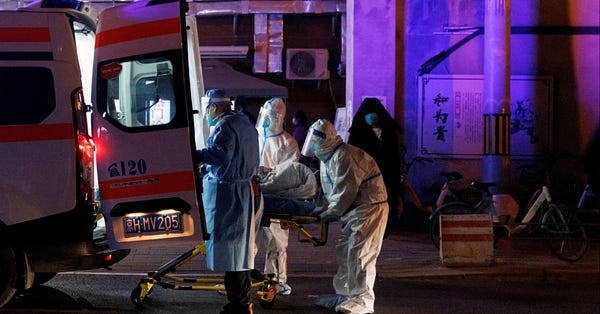Welcome to the 145th edition of Trade War.
Before we get to the news of the week, a quick publishing note and a suggestion. Trade War will take a hiatus for three weeks with plans to resume with our next issue on January 8, 2023. You can look forward to us being back on our regular publishing schedule then.
And a suggestion: if you are struggling to decide what holiday gift to get someone, consider giving this newsletter, providing the latest, most vital news on China, one of the most important countries and economies in the world.
It’s very simple - just follow the instructions in this link on how to give a gift subscription (or go to the homepage of Trade War, then add “/gift” to the end of the URL.)
And have a safe holiday and new year. On to the news:
Disturbing signs of a surge in Covid deaths in China’s capital. Low official count of mortalities necessary to satisfy state narrative of superior governance. And PCR testing booths abandoned in cities across country.
Even as Foxconn declares end to Zhengzhou lockdown, factories across China are bracing for Covid infections and preparing to once again use “closed-loop” manufacturing. Mountains of undelivered parcels in Beijing suggest delivery workers already hard hit by the virus. And gloomy November indicators show economy is skidding.
Central Economic Work Conference signals a new overture to private business. But actions more important than words, for spooked entrepreneurs. Even as Washington blacklists semiconductor giant YMTC, Beijing has surprisingly muted response to latest sanctions. And a breakthrough in Hong Kong, as Chinese officials allow U.S. inspectors unfettered access to company audits.
So an overarching question for 2023: Will Beijing’s surprising new conciliatory stance towards the private sector and foreign companies last?
All this and much, much more, in the latest edition of Trade War.
Signs of surge in Covid mortalities
There are disturbing signs that Covid deaths are starting to surge in China’s capital, following the recent end to tight pandemic restrictions, reports the Financial Times.
“We cremated 150 bodies [on Wednesday], many times more than a typical day last winter,” an employee at the Beijing Dongjiao Funeral Home said to Financial Times’ reporters, estimating that 30 to 40 of them had Covid. “We are doing it as quickly as possible [and] prioritizing Covid deaths,” the employee added. “We’re cremating them the same day they are brought in.”
Workers at two Beijing crematoria told the Financial Times that the number of deaths they were dealing with were now well above normal. Chinese officials have reported no Covid deaths in the country since December 4.


Death toll is ‘highly political’
One reason why recorded mortalities may remain low is because of how Beijing counts them - and also because of the highly politicized nature of China’s management of the pandemic.
“China counts Covid deaths differently from many countries. Health authorities count only those who died directly from Covid-19, excluding those whose underlying conditions were worsened by the virus,” explains the Associated Press’ Dake Kang in a tweet thread and article.
“In the U.S. and many other countries, any death where the coronavirus is a factor or contributor is counted as a Covid-19-related death. Experts say China’s counting methodology has been longstanding practice and isn’t necessarily proof of deliberate undercounting,” Kang writes.
Still, the counting is vulnerable to meddling.
“Automatically every death where the person tested positive as a Covid death provides a clear, objective standard, whereas determining if Covid was the main cause of death is trickier and more subjective.”
And equally if not more important, is how politics has intruded into Beijing’s pandemic narrative:
“Beijing has staked its reputation on its Covid response, so the death toll is highly political. The lower the toll, the more officials can boast of China's superior governance,” Kang writes.


PCR testing booth: ‘Forlorn and unvisited’
“Lonely worker at the local PCR testing booth. The line for this spot was sometimes down the block. Now, it’s forlorn and unvisited,” tweets Bloomberg News’ James Mayger.
“She looked startled when I approached and then rapidly started getting ready to swab me. I almost felt bad walking on without getting a test.”


Foxconn ends closed-loop; new lockdowns likely
Even as Foxconn announced it would end the lockdown at its troubled Zhengzhou iPhone factory, the likelihood of many more new lockdowns across China’s manufacturing sector is growing, reports Bloomberg News.
After founder Terry Gou reportedly warned the Chinese government that Covid Zero was risking permanent damage to the country’s starring role in global supply chains, and following Beijing’s chaotic surprise unwinding of most pandemic controls, Foxconn will end restrictions at its iPhone manufacturing hub in the capital of Henan.
The company is abandoning the “point-to-point” system in which workers were ordered to limit their movements to the dormitory and factory floor, Foxconn’s WeChat account said on Wednesday.
“Foxconn will now need to address the potential increase in sickened staff and a possible shortage of workers,” says IDC researcher Will Wong. “More initiatives will need to be taken to appease staff, other than financial compensation.”
Keep reading with a 7-day free trial
Subscribe to Trade War to keep reading this post and get 7 days of free access to the full post archives.

